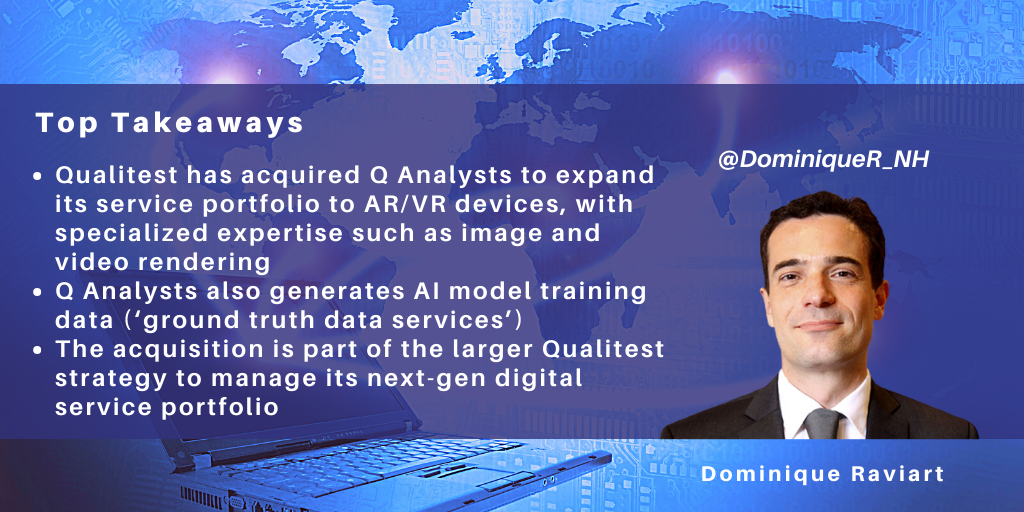Search posts by keywords:
Filter posts by author:
Related NEAT Reports
Other blog posts
posted on Apr 05, 2023 by Dominique Raviart

We recently talked to Qualitest about its latest acquisition, Q Analysts, its sixth since 2019. Qualitest has been on an accelerated transformation journey under the ownership of PE BridgePoint. Q Analysts further strengthens Qualitest’s capabilities in next-gen digital QA, with expertise in testing AI-based devices such as AR/VR/MR headsets and generating data for training AI models.
Qualitest Has Accelerated its Transformation
Qualitest has bold growth ambitions targeting $1bn in revenues by 2026, and in support of this, it has further shifted its delivery network to India to gain scale. The QA Infotech and ZenQ acquisitions helped significantly in this respect. NelsonHall estimates that Qualitest has ~45% of its headcount in India, or ~3,400 FTEs. We expect this India-centricity to increase further.
Qualitest has also further verticalized its GTM, its salesforce now being organized around the following industry groups: technology, BFSI, healthcare & life sciences, telecoms, utilities, retail, and media & entertainment. In parallel, Qualitest has expanded its focus from its core technology clients to BFSI (now 30% of revenues, on par with technology). It recently strengthened its healthcare and telecom expertise with the Comply and Telexiom transactions.
The company is specializing its service portfolio and, at the same time, investing in automation. Continuous testing remains a priority. The 2019 acquisition of data science company AlgoTrace jumpstarted Qualitest’s expertise in AI-based testing. NelsonHall believes that AI-based automation will disrupt the QA industry by automating the generation of test scripts and breaking the lengthy requirement-test case-test script cycle by removing the test case phase.
Q Analysts Brings Specialized Testing Services for AI-based Connected Devices
Qualitest has developed its digital services portfolio beyond traditional mobile app testing, introducing next-gen offerings. The acquisition of Hyderabad-based ZenQ brought in capabilities around blockchain and testing connected devices such as smart homes, pet care, fetal health, and drones.
Now, the acquisition of Q Analysts further increases Qualitest’s investment in digital testing offerings, looking at products described as ‘AI-infused devices,’ i.e., AR/VR devices and virtual assistants.
Q Analysts currently services tier-one technology firms engaged in AR/VR/MR, wearables, and virtual assistant devices. The company has ~600 employees, is headquartered in Kirkland, WA, and has offices in Santa Clara, CA. Q Analysts has testing labs in Kirkland, Santa Clara, and Antananarivo, Madagascar. It has structured its portfolio around two activities: testing of ‘AI-infused devices’ (60% of revenues); and generating training data for these devices (40% of revenues).
The company has worked on AR/VR testing activities, often at the prototyping stage. It offers a full range of services, from devices to mobile apps, web applications, usability testing, and back-office integration testing. As with mobile devices, AR/VR devices bring specific QA activities, such as assessing the performance of an application on a device and estimating the impact of running this application on the device’s battery.
Q Analysts highlights its expertise goes beyond device testing. The company’s sweet spot is assessing image and video rendering on the device. The company has invested in its workforce to identify rendering issues such as image refresh rate or pixelization, a capability only a trained human eye can spot.
The company continues to invest in visual testing in the AR/VR/MR space. For example, the company tests new technologies such as foveated rendering (i.e., the devices have in-built inward-facing cameras to track a user’s eye movement and render images of higher resolution where the eye is focused) to minimize energy consumption and make device batteries last longer. The company considers visual testing to be key and requires advanced visual and technical skills.
Q Analysts’ second activity is generating training data or ‘ground truth data services’, a term borrowed from the meteorology industry. The company will generate training data in its labs and capture images and movements required using cameras and LiDAR scanners. Q Analysts’ know-how comes into play by generating datasets based on its client’s demographics and providing several real-world simulated set-ups, such as living rooms and offices and other variances (such as furniture and interior decoration). Q Analysts also provides related specialized services such as manual 2D and 3D image tagging to help train AI models.
High Potential Ahead
Qualitest has big ambitions for Q Analysts based on the expectation that demand for connected ‘AI-infused devices’ will expand from its product engineering niche. The use of AI-infused devices will become increasingly common across industries; for example, retail (virtual try-on), healthcare (physical therapy and 3D models), and energy & utilities (digital twin-based training). Longer term, Q Analysts targets the metaverse, expanding from its AR/VR and other AI device niche to the larger virtual world opportunity.
Complementing Q Analysts’ specialized capabilities, Qualitest brings increasing expertise in AI-based automation, including computer vision testing and connected device test automation. Client demand looks limitless, and Qualitest is building its next-gen testing expertise to address that demand year after year.
